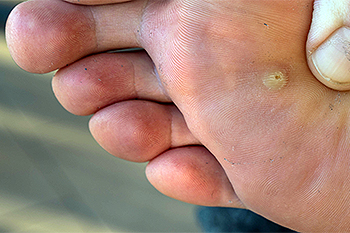
Plantar warts are benign growths that develop on the soles of the feet due to an infection with the human papillomavirus, or HPV. These warts can appear as small, rough lesions and are often mistaken for calluses. There are various types of plantar warts, including common warts, which are usually painless, and mosaic warts, which cluster together in groups. Symptoms include discomfort or pain while walking, especially when pressure is applied to the wart. The warts may also have tiny black dots in the center, which are small blood vessels. Plantar warts are primarily caused by direct contact with the virus, often found in moist environments like swimming pools and locker rooms. Plantar warts can be painful and may cause difficulty in completing daily activities. If you have developed this condition, it is strongly suggested that you promptly contact a podiatrist who can offer you the correct treatment method.
Plantar warts can be very uncomfortable. If you need your feet checked, contact Richard M. Allen, DPM from Idaho. our doctor will assist you with all of your foot and ankle needs.
About Plantar Warts
Plantar warts are the result of HPV, or human papillomavirus, getting into open wounds on the feet. They are mostly found on the heels or balls of the feet.
While plantar warts are generally harmless, those experiencing excessive pain or those suffering from diabetes or a compromised immune system require immediate medical care. Plantar warts are easily diagnosed, usually through scraping off a bit of rough skin or by getting a biopsy.
Symptoms
- Lesions on the bottom of your feet, usually rough and grainy
- Hard or thick callused spots
- Wart seeds, which are small clotted blood vessels that look like little black spots
- Pain, discomfort, or tenderness of your feet when walking or standing
Treatment
- Freezing
- Electric tool removal
- Laser Treatment
- Topical Creams (prescription only)
- Over-the-counter medications
To help prevent developing plantar warts, avoid walking barefoot over abrasive surfaces that can cause cuts or wounds for HPV to get into. Avoiding direct contact with other warts, as well as not picking or rubbing existing warts, can help prevent the further spread of plantar warts. However, if you think you have developed plantar warts, speak to your podiatrist. He or she can diagnose the warts on your feet and recommend the appropriate treatment options.
If you have any questions please feel free to contact our office located in Lewiston, ID . We offer the newest diagnostic and treatment technologies for all your foot and ankle needs.
